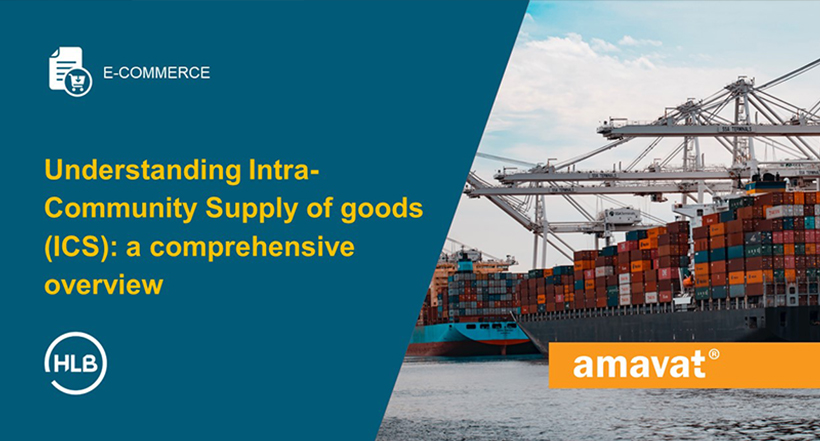Understanding Intra-Community Supply of Goods (ICS): A Comprehensive Overview
In today’s globalized economy, international trade is a cornerstone of economic activity. Businesses engage in cross-border transactions to meet market demands and capitalize on diverse opportunities. Within the European Union (EU), the concept of Intra-Community Supply of Goods (ICS) plays a pivotal role in facilitating seamless trade among member states. This article aims to provide a comprehensive understanding of ICS, its intricacies, and its significance for businesses operating within the EU.
The Intra-Community Supply of Goods, often abbreviated as ICS, refers to the movement of goods between EU member states. It is a fundamental concept within the framework of the EU’s value-added tax (VAT) system, designed to ensure that the transfer of goods across borders within the EU is subject to a harmonized set of rules.
The legal basis for ICS is established in the VAT Directive (Directive 2006/112/EC), which sets out the common rules for the EU’s VAT system. Additionally, further regulations and guidelines are provided by individual member states to streamline the application of ICS.
Essential Components of ICS
An Intra-Community Supply of Goods involves three key components:
- Movement of Goods: Physical transfer of goods from one EU member state to another.
- Change of Ownership: The transfer of ownership or the right to dispose of the goods during the movement.
- VAT Registration: Both the supplier and the acquirer must be VAT-registered entities in different member states.
Conditions and Requirements for ICS
To qualify as an Intra-Community Supply of Goods, certain conditions must be met by both the supplier and the acquirer. Understanding these conditions is crucial for businesses to comply with the VAT regulations and avoid potential issues.
- VAT Registration
- Valid VAT Identification Numbers
- Proof of Transport
Both the supplier and the acquirer must be VAT-registered entities in their respective member states. This registration is a prerequisite for engaging in ICS and is crucial for proper tax reporting and compliance.
To facilitate the identification of businesses engaged in ICS, valid VAT identification numbers (VATINs) must be provided by both the supplier and the acquirer. This ensures traceability and enables tax authorities to monitor and regulate intra-community transactions effectively.
One of the key requirements for an ICS is the proof of transport of goods from one member state to another. Proper documentation, such as invoices, shipping documents, and transport contracts, must be maintained to substantiate the cross-border movement of goods.
Taxation and Reporting Obligations in ICS
The VAT treatment of Intra-Community Supplies of Goods is characterized by a zero-rate mechanism. This means that, while the supply is subject to VAT, the rate applied is 0%, effectively exempting the transaction from VAT liability. However, the zero-rate is contingent upon meeting all the necessary conditions and requirements.
To enhance transparency and information exchange among member states, businesses engaged in ICS are required to submit a Recapitulative Statement. This periodic report summarizes all intra-community transactions and provides tax authorities with a comprehensive overview of cross-border movements of goods.
Challenges in ICS
Despite the well-defined regulations surrounding ICS, businesses may encounter challenges and pitfalls that can complicate compliance. Identifying and addressing these issues is crucial for maintaining the efficiency of cross-border trade operations.
- Administrative Burden
- VAT Fraud and Carousel Schemes
The administrative requirements for ICS, including the documentation of proof of transport and the submission of Recapitulative Statements, can impose a significant administrative burden on businesses. Streamlining these processes through automation and digital solutions can help alleviate this challenge.
ICS transactions are susceptible to VAT fraud, particularly carousel fraud, where goods are moved through a series of transactions designed to exploit the VAT system. Businesses must implement robust internal controls and due diligence processes to mitigate the risk of becoming unwitting participants in such schemes.
Digitalization and Reporting
The EU is increasingly embracing digital solutions for tax reporting and compliance. Businesses should anticipate the transition towards more automated processes in ICS, such as the use of electronic platforms for submitting Recapitulative Statements and other relevant documentation.
The United Kingdom’s withdrawal from the EU, commonly known as Brexit, has introduced new considerations for businesses engaged in ICS. Companies operating between the UK and the EU must navigate additional customs and VAT complexities, necessitating a thorough understanding of post-Brexit trade arrangements.
In conclusion, the Intra-Community Supply of Goods (ICS) is a fundamental concept within the EU’s VAT system, playing a crucial role in facilitating seamless trade among member states. Businesses must grasp the intricacies of ICS to ensure compliance with VAT regulations, mitigate risks, and capitalize on the benefits of cross-border trade within the EU. Staying informed about recent developments and proactively adapting to changes will empower businesses to navigate the complexities of ICS successfully in the evolving landscape of international trade.

If you have any questions related to the intra-Community supply of goods, conditions and possibilities and benefits of using the ICS, our advisor will answer all your doubts!
If you are running an e-commerce business and you are using or planning to use ICS and you are looking for a comprehensive and unique accounting for e-commerce, we invite you to contact our experts: Contact – amavat®.
amavat® Team




